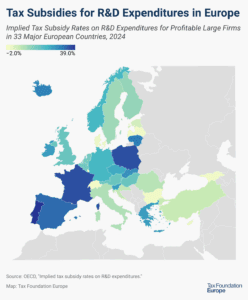
From the EU Digital Services Tax Debate—to the OECD?
5 min readBy:The proposal from the European Commission to taxA tax is a mandatory payment or charge collected by local, state, and national governments from individuals or businesses to cover the costs of general government services, goods, and activities. revenues from some digital services at 3 percent has taken on a new form following the lack of agreement among EU member states. The original proposal, introduced in March 2018, had a chance to be adopted or rejected on December 4, 2018, at a meeting of EU finance ministers. Instead, because of efforts by France and Germany, the proposal has been reframed to target only revenues from digital advertising—significantly narrowing the scope from the original proposal in March. The proponents of the narrowed digital services tax (DST) hope to achieve agreement among the current 28 member states on this narrowed proposal by March 2019.
The EU DST has been widely criticized and even a narrower version of the proposal would create serious challenges for tax administration and compliance.
There are many individual countries, including in the EU, that plan to move ahead with their own, separate DST proposals. These include unilateral proposals by Spain and the UK. France is also expected to adopt its own unilateral measure.
There is broad agreement among EU member states and in other parts of the world that something should change in international tax policy to address the challenges of taxation in the digital economy. Discussions on this topic have been ongoing at the Organisation for Economic Co-operation and Development (OECD) for many years, but without much progress on an agreement.
[global_newsletter_inline_widget campaign=”//TaxFoundation.us1.list-manage.com/subscribe/post?u=fefb55dc846b4d629857464f8&id=6c6b782bd7&SIGNUP=ITCI”]
The OECD Base Erosion and Profits Shifting (BEPS) agenda included addressing the tax challenges of the digital economy as its first action item. A report exploring the difficult issues of this debate was released in 2015. Since that report, the OECD held a public consultation in 2017 in the context of the Task Force on the Digital Economy (TFDE) and issued an interim report in March 2018.
Though it did not provide specific recommendations, the OECD interim report laid out the serious challenges to designing tax policy specifically targeted at the digital economy. A key takeaway from the report is that designing tax policy specific to digital business models is not the right approach because the digital economy is rapidly evolving, and most businesses are becoming more digital in some way.
At its core, the digital debate is about reallocating taxable profits from one taxing jurisdiction to another. If a company has no employees or property in a country where it makes lots of sales, should some of that company’s taxable profits be allocated to the market country based on that market activity?
The answer that many countries have to that question is, “Yes,” but they differ in their approaches.
Officials from the U.S. Treasury have recommended to the OECD that a company’s taxable profits should be allocated to a market jurisdiction based on investment in marketing intangibles in that jurisdiction. If a company invests in advertising its valuable trademark or brand in a market jurisdiction, hoping to drive up sales, that level of investment could be a metric to allocate taxable profits to that market country. This would be a broad approach and impact multinational firms operating in a variety of sectors. However, if marketing investment could trigger tax in a jurisdiction where a company previously did not owe tax, then this approach would likely impact the decisions by companies on how and where they market their products.
Stay informed on the tax policies impacting you.
Subscribe to get insights from our trusted experts delivered straight to your inbox.
SubscribeThe United Kingdom has a different approach that it would like to see the OECD pursue. The UK would like profits to be allocated based on the location of users that interact with digital companies. This is based on a theory that the value created by users should be taxed in the jurisdiction where the users are located rather than the location where their data is processed and analyzed. Allocating taxable profits of multinationals based on the location of their digital users could create privacy concerns if governments expect those firms to track the location of their users for tax purposes.
Germany and France are working on a third approach at the OECD. They would prefer to solve this issue with a global minimum tax, perhaps modeled after the Global Intangible Low Tax Income (GILTI) provision in the new U.S. tax law. This approach would effectively set an international floor for corporate tax rates faced by foreign subsidiaries of multinationals and limit tax competition.
Each of these approaches to shifting taxing rights will get more attention as the debate moves forward at the OECD even as the debate over an EU DST narrows its scope.
In January 2019, the OECD is expected to provide an update on its approach to shifting tax policy in light of the digital economy. In the OECD report to the G20 leaders, the various deadlines for moving forward in this discussion were laid out, with an update scheduled for June 2019 and a final report in 2020.
A potential conclusion to this debate at the OECD could reshape the international tax landscape in significant ways and impact investment and business structure decisions by multinational corporations. It is important for policymakers to think of how these changes might impact the stability, transparency, complexity, and neutrality of the international tax system. After global foreign direct investment fell by 23 percent in 2017, it is important to take account of how international tax policy might contribute to roadblocks to new investment and productivity, and avoid policies that could hurt global growth for years to come.
[global_newsletter_inline_widget campaign=”//TaxFoundation.us1.list-manage.com/subscribe/post?u=fefb55dc846b4d629857464f8&id=6c6b782bd7&SIGNUP=ITCI”]
Share this article




